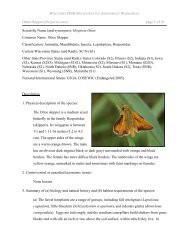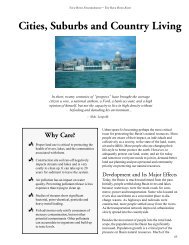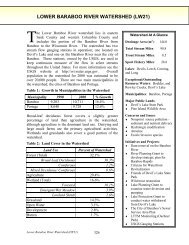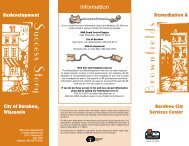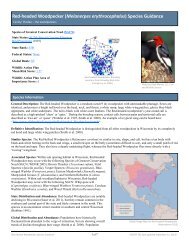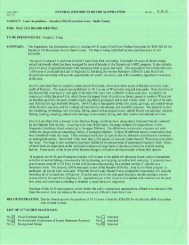Unit 1 [PDF] - Wisconsin Department of Natural Resources
Unit 1 [PDF] - Wisconsin Department of Natural Resources
Unit 1 [PDF] - Wisconsin Department of Natural Resources
Create successful ePaper yourself
Turn your PDF publications into a flip-book with our unique Google optimized e-Paper software.
Chapter 3<br />
Responsible Trapping<br />
Legal Obligations<br />
FWS Photo<br />
Trappers, hunters, and anglers<br />
must know the regulations and<br />
follow them to help conserve<br />
resources, and to be accepted<br />
in the conservation community.<br />
Trappers and fur hunters must<br />
always take the high road.<br />
Obeying the law is always the<br />
minimum standard <strong>of</strong> conduct.<br />
Chapter 3 - Responsible Trapping<br />
Objective - Students demonstrate an awareness <strong>of</strong> their responsibilities<br />
to landowners, wildlife, other outdoor users, and the public.<br />
Introduction<br />
Trappers and hunters have a legal responsibility to follow regulations.<br />
Trappers and hunters have a moral obligation to make good decisions when<br />
their actions might affect wildlife, landowners, other outdoor users or the<br />
public. Ethical trappers and hunters consistently make decisions that result in<br />
the greatest good for wildlife, the environment and people.<br />
Legal and Social Obligations<br />
Trapping and hunting is a constitutional right in <strong>Wisconsin</strong>, but on private<br />
lands is still a privilege based on your responsible, ethical actions. Society<br />
expects trappers and hunters to behave in certain ways if they want to<br />
participate. That is why we have regulations for seasons, traps, sets, permission<br />
to trap and public safety. Those who fail to follow regulations face possible<br />
fines, jail time and the loss <strong>of</strong> licenses. Illegal trappers also face disapproval<br />
from other trappers and outdoor users. If you want to be accepted by other<br />
trappers, you must know the regulations and follow them.<br />
Responsible Trapping<br />
Laws cannot define what is right or wrong for you in every situation. You<br />
must use judgment based on your knowledge, skills, attitudes and experience<br />
to decide what is right or wrong. You can learn from your family or a trusted<br />
mentor. In time, you will understand how to make good decisions on your own.<br />
Your relationships with other people, and your social acceptance as a trapper,<br />
develop as people come to know how you behave. When you behave in ways<br />
that are good for animal welfare, landowners, other outdoor users and the<br />
public, you will be an ethical trapper.<br />
<strong>Wisconsin</strong> Trapper Education Manual 14


![Unit 1 [PDF] - Wisconsin Department of Natural Resources](https://img.yumpu.com/18098067/22/500x640/unit-1-pdf-wisconsin-department-of-natural-resources.jpg)
![Nature program winter schedule [PDF] - Wisconsin DNR](https://img.yumpu.com/22471254/1/190x245/nature-program-winter-schedule-pdf-wisconsin-dnr.jpg?quality=85)
![City of Middleton [PDF] - Wisconsin Department of Natural Resources](https://img.yumpu.com/22300392/1/190x245/city-of-middleton-pdf-wisconsin-department-of-natural-resources.jpg?quality=85)
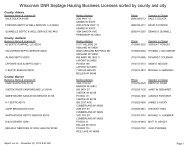
![Wetland Conservation Activities [PDF] - Wisconsin Department of ...](https://img.yumpu.com/21975633/1/190x245/wetland-conservation-activities-pdf-wisconsin-department-of-.jpg?quality=85)
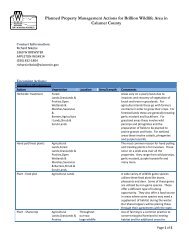
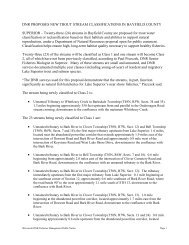
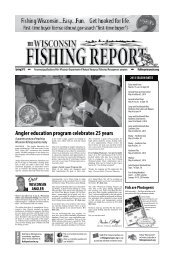
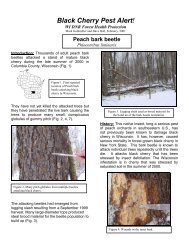
![Baraboo River Region[PDF] - Wisconsin Department of Natural ...](https://img.yumpu.com/21975619/1/190x245/baraboo-river-regionpdf-wisconsin-department-of-natural-.jpg?quality=85)
